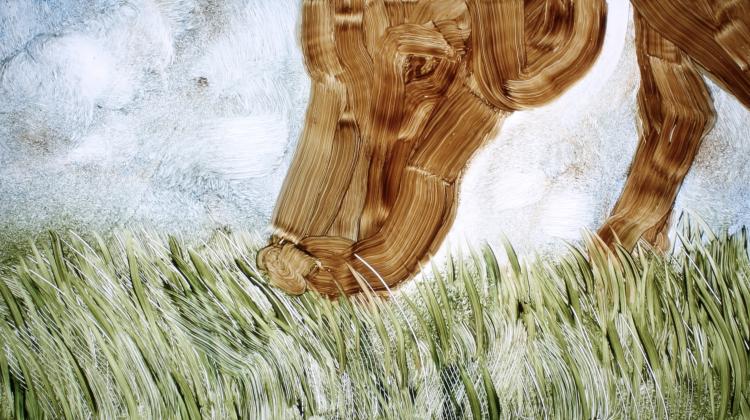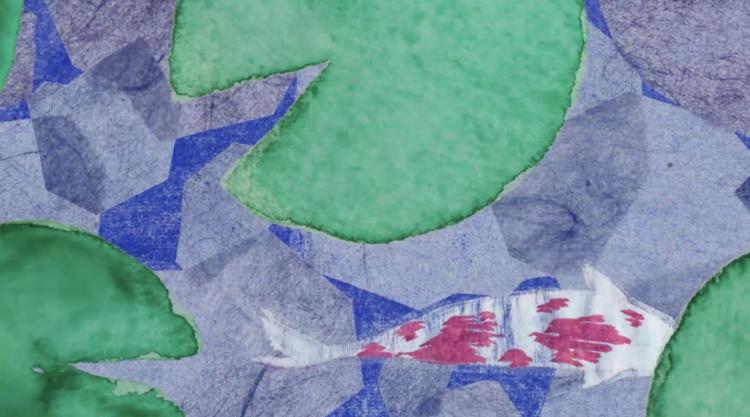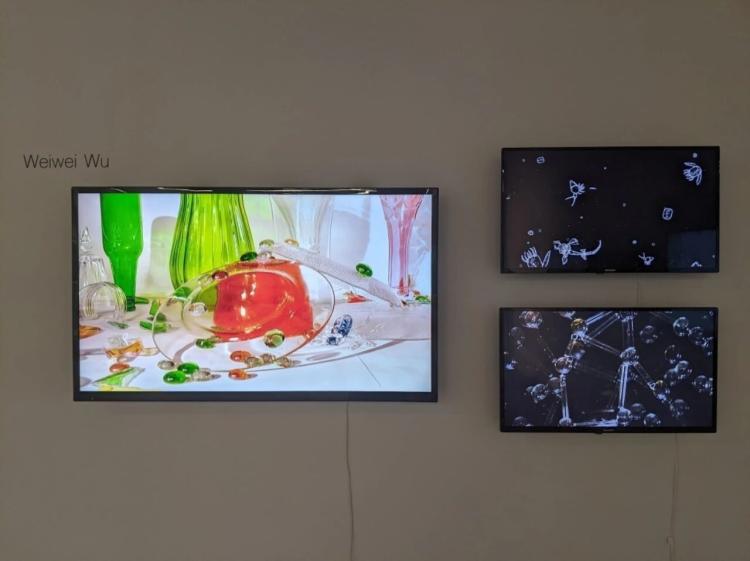
From Marina Levit's (BFA 2024) research into oil paint. (Image courtesy Animate Materials Workshop)
The funding paves the way for the media historian and ECU faculty member to expand the project's focus and reach over the next five years.
Film and media historian and Emily Carr University of Art + Design (ECU) faculty member Dr. Alla Gadassik is the recipient of a $260,000 Social Sciences and Humanities Research Council (SSHRC) Insight Grant in support of her groundbreaking Animate Materials Workshop (AMW).
The AMW is an interdisciplinary research incubator that embraces animation as a unique method of understanding the scientific and cultural history of materials.
"I wanted to develop the equivalent of a research lab focused on understanding materials with and through animation, because animation requires working with materials very closely and learning how to bring them to life," Alla says. "The idea was inspired by early materials science when labs were more like alchemy workshops that blended theoretical knowledge, artisanal hands-on practice, and deep interest in how humans should relate to the world around them. The Animate Materials Workshop focuses on animation as a method of collaborating with materials and allowing them to tell their own stories. How can we creatively collaborate with graphite, sand or other materials that are taken for granted but shape our world?"


From Mia Milardo's (BMA 2023) research into gouache (top) and Weiwei Wu's (BMA 2023) exploration of glass (bottom), both of which were featured in Refractions, a 2023 exhibition curated by Alla at the Michael O'Brian Exhibition Commons. (Images courtesy Animate Materials Workshop)
The AMW was first developed through a 2021 SSHRC Insight Development Grant. Over two years, Alla investigated how the workshop could engage students, artists and the public. This first phase supported the work of a dozen ECU students, whose projects ranged from arts-based research to designing and testing a portable animation stand. The primary material focus was graphite and its artistic, cultural and ethical histories.
An accompanying film program toured festivals and galleries in Canada and New Zealand. The program included You Feel Soft, a 2022 film by award-winning animator Cameron Kletke (BMA 2023) as part of their work with the AMW. This research and curatorial work informs Alla's book Graphite: Animated Traces, which explores the role of graphite as a creative medium in contemporary art and animation. The book will be published by the Govett-Brewster Art Gallery later this year.
The acquisition of Alla's latest, highly competitive SSHRC Insight Grant will fund the AMW's next five years of workshop activities and research expansion, including collaboration with animation artists and materials scientists. The AMW will broaden its focus to include four more materials: sand, plastic, pigment and fibre.
This last material was at the heart of Alla's recent appearance as guest curator at the Ottawa International Animation Festival, where she presented a program of short films titled Threads and Fibres. Fibre also informs the ambitious upcoming exhibition Interlaced: Animation and Textiles which Alla curated for the Len Lye Centre in New Zealand.
Watch Video: Cameron Kletke, You Feel Soft, 2022. Animated film.
As a media scholar and historian, Alla notes her excitement at the opportunity to foster a model for how media research can happen at an art and design university.
"The Animate Materials Workshop turns to animated filmmaking as a method of studying materials and communicating material history, material culture and science to a broad public," she says. "It asks filmmakers to reflect on the material ecology of their work, and it also takes seriously the role that artists play in contributing to a broader intellectual and even scientific understanding of materials."
The workshop's carefully designed research-creation model provides paid opportunities for students at all levels of degree studies. First- or second-year students can join as junior research assistants (RAs) who support existing animation projects and undertake faculty-supervised research. Third- and fourth-year students can advance to become senior RAs, who can propose their own projects and work with external collaborators supported by the grant. Uniquely, AMW also provides opportunities for newly graduated alumni, who can return as advanced RAs to mentor the junior and senior contributors.
Alla presents to the audience at the 2024 Ottawa International Animation Festival (top) as part of her curatorial work on the Threads and Fibres film program which included early cinema examples of hand-coloured celluloid films of silk veil dances. (Images courtesy Animate Materials Workshop)
"One of the things I love about the pre-industrial scientific and artisanal workshop is the idea of sustained apprenticeship and the opportunity to learn from others, as well as to explore and experiment," Alla says. "So, I've set up a model where students are able to work across not just one project or summer, but across numerous years, including after they graduate."
In general, SSHRC funding does not consider alumni to be student research assistants, meaning their inclusion in a grant application can work against its endorsement.
"I specifically wrote newly graduated alumni into my grant," Alla continues, "and I was delighted that my application's reviewers noticed this inclusion and supported my argument about the importance of this stage of a student's degree progress."
Alla notes the AMW would not have been possible without the support of colleagues and staff at ECU who are "passionate about animation and invested in material arts-based research."
A workshop website will be launched this year featuring public resources and a curated media archive.
Emily Carr University offers two industry-leading animation programs: 2D + Experimental Animation and 3D Computer Animation.
Our 2D + Experimental Animation program explores both traditional and experimental animation techniques, while our 3D Animation program focuses on learning digital tools to create immersive worlds and characters. Both programs emphasize storytelling, technical skills and interdisciplinary collaboration to prepare students for careers in film, gaming and more.












